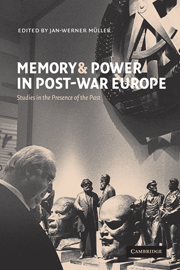Book contents
- Frontmatter
- Contents
- List of contributors
- Acknowledgements
- Introduction: the power of memory, the memory of power and the power over memory
- Part 1 Myth, memory and analogy in foreign policy
- 1 Memory of sovereignty and sovereignty over memory: Poland, Lithuania and Ukraine, 1939–1999
- 2 Myth, memory and policy in France since 1945
- 3 The power of memory and memories of power: the cultural parameters of German foreign policy-making since 1945
- 4 The past in the present: British imperial memories and the European question
- 5 Europe's post-Cold War remembrance of Russia: cui bono?
- 6 Memory, the media and NATO: information intervention in Bosnia-Hercegovina
- Part 2 Memory and power in domestic affairs
- Index
6 - Memory, the media and NATO: information intervention in Bosnia-Hercegovina
Published online by Cambridge University Press: 22 September 2009
- Frontmatter
- Contents
- List of contributors
- Acknowledgements
- Introduction: the power of memory, the memory of power and the power over memory
- Part 1 Myth, memory and analogy in foreign policy
- 1 Memory of sovereignty and sovereignty over memory: Poland, Lithuania and Ukraine, 1939–1999
- 2 Myth, memory and policy in France since 1945
- 3 The power of memory and memories of power: the cultural parameters of German foreign policy-making since 1945
- 4 The past in the present: British imperial memories and the European question
- 5 Europe's post-Cold War remembrance of Russia: cui bono?
- 6 Memory, the media and NATO: information intervention in Bosnia-Hercegovina
- Part 2 Memory and power in domestic affairs
- Index
Summary
If collective or social memory is power, then those engaged in the contest for control will seek to manage its production. One of the most important ways in which public or national memories have been nourished, shaped and limited in the twentieth century has been through broadcasting and, in the period since the late 1950s, more specifically through television. Television is one of the prime means by which to establish what Timothy Snyder in his chapter calls ‘sovereignty over memory’, and to provide both a national framework for collective memory and to shape individual memories of national events. In this chapter, I want to explore an important episode in the management of memory as an instrument of conflict prevention or resolution, namely the role played, in Bosnia-Hercegovina in the late 1990s, by the US-led NATO Stabilisation Force (Sfor) and the Office of the High Representative (OHR). As Ilana R. Bet-El shows in her chapter, the Bosnian context was one in which, for generations and centuries, memories were articulated, projected and raised as flags of combat. Television gave a whole new force to such articulations.
The narrative of control of information in Bosnia can be linked to the history of efforts by one state, or a group of states, to influence the articulation or suppression of particular narratives within the borders of another state.
- Type
- Chapter
- Information
- Memory and Power in Post-War EuropeStudies in the Presence of the Past, pp. 137 - 154Publisher: Cambridge University PressPrint publication year: 2002
- 5
- Cited by

